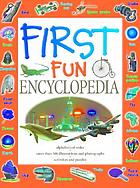First Fun Encyclopedia

Available on EBSCO
EBSCO only has the encyclopedia available digitally for now. The entire encyclopedia is available as HTML full text with graphics. The EBSCO version has 118 entries arranged alphabetically. Each entry has a persistent link feature available so users can email or post links back to the entry. The encyclopedia is searchable and references are cross-linked.
Encylopedia Articles are Written for Young Readers
Categorized under the subject heading "Youth & Children's Interests" the text is written at a LEXILE rating of no more than 730. To give an idea of how the book is arranged the "Ocean and Seas" entry also directs users to the "Animal Kingdom" entry. For vocabulary skills, entries include a word box related to the subject with short, simple definitions. Some entries include a word game or puzzle for fun. Each entry has high-resolution graphics to accompany the text that are instructional rather than decorative. The "Fish" entry, for example, has an illustration of a fish with labels identifying the essential anatomical parts. The entry on "Trains" includes graphics of different types of trains — subways, bullet trains, steam trains, and so forth. The entry on "Homes" describes tall homes, tent homes, and houses in rows.
No entry is more than 400 words.
Create Non-Fiction Text Sets
Teachers can use the entries from the First Fun Encyclopedia to create text sets for their classrooms. For example, if an English Language Arts teacher plans to teach a unit on Carl Hiassen's novel Flush, a book that takes place in Florida, then the teacher can pre-select non-fiction articles to supplement the reading. Have kids read about the sealife of Florida, or about ecology, and environmental protection efforts to create sustainable habitats for animals.
Source: Walker, Jane. First Fun Encyclopedia. Philadelphia: Mason Crest, 2003. Internet resource.
